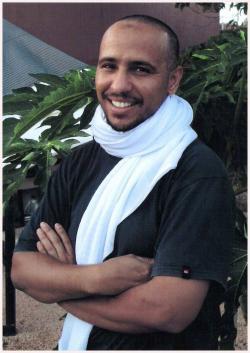 Mohamedou Ould Slahi is one of the Gunatanmo detainees condemned to indefinite detention. In 2005 he started writing his memoirs in English. His draft of 466 handwritten pages was completed a year later but the authorities suppressed it for six years. A redacted version has finally been published. Selected excerpts from the memoir can be here, prefaced by an introduction by Larry Siems who explains how Slahi ended up at Guantanamo.
Mohamedou Ould Slahi is one of the Gunatanmo detainees condemned to indefinite detention. In 2005 he started writing his memoirs in English. His draft of 466 handwritten pages was completed a year later but the authorities suppressed it for six years. A redacted version has finally been published. Selected excerpts from the memoir can be here, prefaced by an introduction by Larry Siems who explains how Slahi ended up at Guantanamo.
Slahi’s story begins in November 2001 when he was aged 30. He was wanted for questioning by police in Mauritania and he went by himself voluntarily. As Siems tell the story, “Slahi wasn’t alarmed because he had been questioned many times: a résumé that read like success for the eighth child of Saharan camel herders was also full of red flags for intelligence services.” But the Mauritanians handed him over to the US who ‘renditioned’ him to Jordan and from there the US sent him to Bagram air force base in Afghanistan in July 2002. He describes the treatment there.
Detainees were not allowed to talk to each other, but we enjoyed looking at each other. The punishment for talking was hanging the detainee by his hands with the feet barely touching the ground. I saw an Afghan fellow detainee who passed out a couple of times while hanging from his hands. The medics “fixed” him and hung him back up. Other detainees were luckier; they were hung for a certain time and released. Most of the detainees tried to talk while hanging, which makes the guards double their punishment.
There was a very old Afghani fellow, who reportedly was arrested to turn over his son. The guy was mentally sick; he could not stop talking because he didn’t know where he was, nor why. But the guards kept dutifully hanging him. It was so pitiful; one day one of the guards threw him on his face, and he was crying like a baby.
Then on August 4, 2002, he was “again hooded, shackled, diapered, and drugged, and put on a flight with 30 other Bagram Air Base detainees for a 36-hour journey to Guantánamo.”
The irony is that after he arrived he told the other prisoners he met there, who had also been abused in other countries, that their ordeal was over, that now that they were in the US, they would be treated well and there would be no torture, and that the US justice system could be trusted. The others were skeptical and now we know that they were justified because Slahi soon started being tortured, with doctors being complicit in it. The only people who treated him decently were the Puerto Rican guards.
Slahi’s descriptions of how he was treated are sickening and yet he tries to humanize his guards, saying “No matter how bad your interrogators are, a family-like relationship develops. This family relationship is just a family relationship, no more, no less, with all the advantages and disadvantages.
Although Slahi won a habeas corpus appeal in 2010, the Obama administration has (of course) appealed and he still remains imprisoned. Is he a complete innocent? Here is another view but the fact is that he is being held without charge for over a decade an no one should be tortured like this.
You can also listen to an interview with Siems.

[…] came to my attention after reading a post by Mano Singham where he outlines the story and includes a CBC interview with Larry Siems about […]